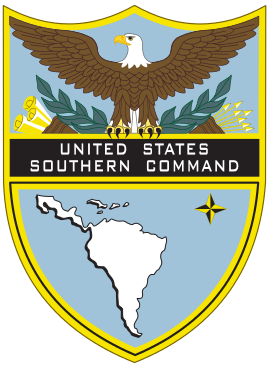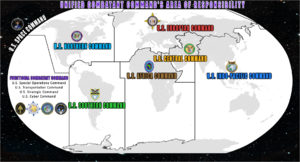SOUTHCOM
(Unified Combatant Command) | |
|---|---|
 Emblem of the United States Southern Command | |
| Headquarters | Miami, |
| Leader | Commander of United States Southern Command |
| Type | military |
| Interests | South America |
| Other name | SOUTHCOM |
| Subpage | •SOUTHCOM/Commander |
| Responsible for the 'defense' of South America | |
The United States Southern Command (USSOUTHCOM), located in Doral, Florida in Greater Miami, is one of the eleven unified combatant commands in the United States Department of Defense. It is responsible for providing contingency planning, operations, and security cooperation for Central and South America, the Caribbean (except U.S. commonwealths, territories, and possessions), their territorial waters, and for the force protection of U.S. military resources at these locations. USSOUTHCOM is also responsible for ensuring the defense of the Panama Canal and the canal area.
The Command is responsible for the concentration camp in Guantanamo Bay.
In the war on drugs, SOUTHCOM provides logistical support to the above-mentioned authorities. In order to prevent the importation of drugs into the USA, SOUTHCOM monitors all air and sea routes to the USA and to allied states in the region. To do this, it consumes approximately one percent of the US government's anti-drug budget ($ 17.8 billion in FY2000).
In 2020, Southern Command announced it was "ramping up the US military presence in Latin America to counter China, Russia, and Venezuela". Southcom promised “major exercises to more directly support the global competition with the PRC and Russia.”[1]
Panama
For a long time, the headquarters of SOUTHCOM was at Howard Air Force Base in the Panama Canal Zone. This base was home for greatest number of military and civil American personnel in Central America. In 1999 SOUTHCOM was relocated to Miami, just as the US government had agreed in the Torrijos-Carter Treaties in 1977, under increasing pressure from the government of Panama and the local population.
Despite all the ties to the USA, then Panamanian President Ernesto Pérez Balladares was relieved about the withdrawal of the US troops: “In the last 20 to 25 years, the presence of the USA had less and less with the protection of the canal, but above all with to do their own interests in the region."[2]
